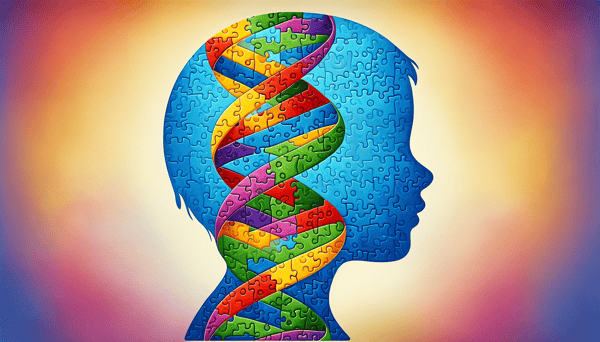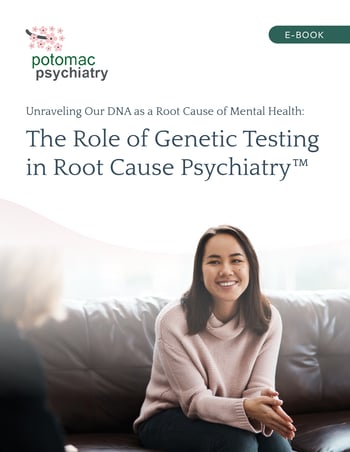Unraveling Our DNA as a Root Cause of Mental Health:
The Role of Genetic Testing in Root Cause Psychiatry™
Introduction

Psychiatric care as we’ve known it is changing. Thanks to incredible advances in genetics, we’ve learned that DNA holds countless insights into the state of your mental health—and genetic testing is the key to unlocking them.
Cutting-edge research reveals that genetic testing helps people get better faster and at a lower cost. How? By helping us pinpoint the root causes of emotional suffering—or, more specifically, Root Cause Psychiatry™—genetic testing plays a vital role in determining the best treatment for each patient’s needs.
With a better idea of the root causes and a focus on “actionable genes” that can be influenced, we can improve patients’ mental health without so much trial and error. In this e-book, we’ll dive into genetic testing and how we can use it to help us realize the dream of tailor-made treatments for each and every individual.
Download a PDF version of this guide by filling out this form, or keep scrolling to learn more.

The Link Between Genes and Mental Health: How Are They Connected?
The Magic of Genetic Testing: Understanding the Root Causes of Mental Health
Navigating the Waters:Your Guide to Approaching Genetic Testing
Let's Explore How Genetic Testing Can Improve Your Mental Health
Our Real-Life Success Stories
- The Link Between Genes and Mental Health: How Are They Connected?
- The Magic of Genetic Testing: Understanding the Root Causes of Mental Health
- Navigating the Waters:Your Guide to Approaching Genetic Testing
- Let's Explore How Genetic Testing Can Improve Your Mental Health
- Our Real-Life Success Stories

The Link Between Genes and Mental Health: How Are They Connected?
Understanding the “Orchid Gene”
Some genes are tied to emotions such as vulnerability and resilience, whereas others are associated with specific symptoms and conditions. Take an “Orchid” gene (SLC6A4 and COMT), for example. Patients can either be categorized as “Orchids” or “Dandelions” based on their genetic makeup and sensitivity to environmental influences.
Because “Orchids”—the people who have orchid gene variations—are highly sensitive to their environment due to certain genetic markers, they may be more vulnerable to adverse experiences. That said, “Orchids” also have the potential to blossom if provided with a supportive environment. Genetic testing is the first step in identifying a patient’s genetic profile and then personalizing treatments guided by their unique genetic makeup.
For instance, the SLC6A4 gene can influence serotonin transporters and, therefore, has been linked to a person’s response to antidepressants, which, depending on the patient’s genetic variation of this gene, can predict a better or worse response to selective serotonin reuptake inhibitors (SSRIs).
This is just one of many examples of how understanding the link between our genes and mental health can help us hone in on the best possible treatment options and prescribe more precisely for each individual.
Resources

Genetic testing helps to pinpoint the genetic root causes of your emotional suffering and plays a vital role in determining what treatment is best for your precise biological needs.
Read More
Since 2013, we’ve used genetic testing to help thousands of our patients, including many hundreds of children, by analyzing how their personal genome plays a role in their mental health.
Read More
The Magic of Genetic Testing: Understanding the Root Causes of Mental Health
What Can Genetic Tests Tell Us?
Just a simple cheek swab or saliva test can unlock a world of information. Genetic tests can predict whether an individual has a higher risk of developing a certain condition, how a person might metabolize or respond to certain medications, and the presence of a genetic variation whose harmful effects can be reduced by medications and/or supplements targeted toward that specific gene.
What Can't Genetic Tests Tell Us?
These tests cannot predict whether or not one will develop a specific mental condition because lifestyle and environmental factors, psychological stressors, acute and chronic diseases, and future mutations will all influence how genes are expressed to create mental illness. It’s also worth noting the test’s specificity and sensitivity can influence the reliability of a genetic test.
Different types of genetic testing analyze different genes and are used to answer specific questions as to why a particular patient has developed certain symptoms and how best to intervene to help them feel well and recover their health. At Potomac Psychiatry, we use scientifically validated, cutting-edge laboratory tests to help us learn more about our patients and personalize treatments just for them, such as:
- IntellxxDNA Test:
- IntellxxDNA personalized genomic reports help us better understand more than 700 genes that impact mental wellness and how to optimize brain health, which leads to exceptionally powerful, individualized prevention and intervention strategies. These gene-targeted interventions include diet, lifestyle, medications, and supplements that numerous scientific studies have identified.
- Genomind Test:
- Genomind PGx testing helps us analyze 26 genes and more than 700 medications, revealing genetic variations to help us personalize treatments and prescribe medications. The PGx test and GenMedPro precision medicine software use patented algorithms based on hundreds of studies to interpret a patient’s test results, which doctors use to help decide the most appropriate class and dose of medication for each patient.
Resources

At Potomac Psychiatry, we have used genetic testing to evaluate and treat over 3000 patients, including those suffering from Alzheimer’s Disease and other dementias.
Read More
By helping to determine your unique genetic makeup, genetic testing can lead to targeted mental health treatments suited to your unique needs, improving your overall quality of life faster than the trial-and-error approach.
Read More
Navigating the Waters:Your Guide to Approaching Genetic Testing
Looking to prevent worsening of symptoms and improve your quality of life? Hoping to prevent cognitive decline and dementia?
If you answered “yes!” to any of these questions, genetic testing may be the perfect next step for you. To help you navigate the waters, we’ll walk you through each step of the genetic testing process at Potomac Psychiatry.
Preparing for Genetic Testing
Preparing for a genetic test is easy and mostly involves researching what to expect. You likely have questions about the process and the logistics, such as:
- What is the actual genetic testing procedure like, and will it hurt?
- How much does genetic testing cost, and will my insurance cover it?
- Will my genetic test results remain private, or will they be shared?
As far as the test itself goes, a test kit will be shipped to your home address, and you will swab the inside of your cheek or provide a saliva sample, depending upon which test has been ordered by your doctor. It’s fast, easy, and painless!
Many insurance plans and health savings accounts cover genetic testing. For example, Genomind accepts all commercial insurance, Medicare, and most Medicaid plans and works with patients based on their financial need to make the test as affordable as possible.
You should be fully aware of what you’re consenting to when you undergo genetic testing. Genetic data is often shared for research purposes, which can be vital for medical advancements; however, the data is anonymized, so your genetic data will not be associated with your name or other personal identifiers. It’s also typically stored for long periods of time, so third-party data security is an important consideration. Potomac Psychiatry can provide the data security measures and other security and HIPAA policies these companies adhere to if requested.
Understanding Your Test Results
Now for the exciting part: After your genetic testing results come back—which can take from five days to three weeks—we’ll work together to create your blueprint or also known as your “root cause road map” to better mental health. This road map will break down the medication, supplements, nutrients, and lifestyle changes necessary to feel better and recover your health.
Keep in mind that a journey of a thousand miles begins with a single step. Effectively treating the genetic root causes of mental health may take months of persistent effort if there are multiple genetic vulnerabilities. That said, genetic testing can help us find the most effective, targeted therapies much faster.
Seeking Additional Support
Once you have a personalized treatment plan based on your unique genetic profile, you’ll likely seek support in the form of communities and resources to help guide you on your journey. You can always access helpful resources on our website—and this list of genetic testing articles is a great place to start.
Resources

Treatment-resistant is a clinical term used to describe the situation when your condition doesn’t respond to a prescription medication as expected – it may work partially, or not at all.
Read More
Adele was diagnosed with postpartum depression following the birth of her daughter, Susan. But her history with depression had begun well before that.
Read More
Let's Explore How Genetic Testing Can Improve Your Mental Health
Since 2013, Potomac Psychiatry has pioneered the use of genetic testing to help more than 3,000 patients assess how DNA plays a role in their mental health—and to build a treatment plan tailored to their unique genetic and epigenetic information systems.
We are nationally recognized experts in the use of genetic testing to help our patients feel better faster and at less cost. Our experts have also blogged, podcasted, and taught genetic testing to other doctors in our field and are committed to helping others learn more about this groundbreaking approach.
By weaving genetic testing into Root Cause PsychiatryTM, we can help you pinpoint genetic root causes and tailor a treatment to your unique biological needs. We'll be there every step of the way, from the initial consultation and cheek swab or saliva sample to the day you say, "I feel better!"
Resources

When it comes to mental health and wellbeing, it’s normal to look for a “norm” or a baseline for how we think we should feel—yet most of us have a hard time trying to define what that baseline really looks like.
Read More
A new genetic test identifies genes that predispose you to “setting your brain on fire” and identifies what you can do to extinguish that fire to improve mental wellness.
Read More
Our Real-Life Success Stories
Genetic tests can be truly life-changing —but don’t just take our word for it: Take a look at real-life stories of people we’ve treated who discovered key insights about their mental health through genetic testing:
- Janice struggled with depression, OCD, and post-traumatic stress disorder.
- Debbie had treatment-resistant bipolar disorder.
- Taylor was a teenager dealing with issues related to attention-deficit/hyperactivity disorder (ADHD).
- Grace was a young child with phobias and social anxiety.
- Charlie almost dropped out of college due to ADHD and substance abuse.
- Alan was an adult struggling with panic attacks, anxiety, and depression.
- Sam was a former senior White House official with anxiety and depression.
Download a PDF version of this guide by filling out the form

.png?width=144&height=144&name=Untitled%20design%20(34).png)
